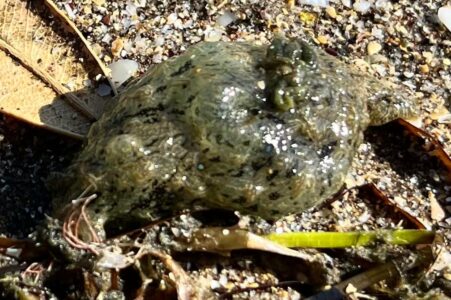
A warning has been sounded by locals after sea slugs washed up on an east Auckland beach.
A woman on a popular social media group posted pictures and information on the sea slugs on January 30.
“Beware – we have sea slugs at Mellons Bay,” she wrote. “Unfortunately, we have an abundance of sea slugs wash up on our beautiful beach today.”
The woman and several others picked up dozens of the slugs that were mainly found among the sea weed. They are described as slimy and are an olive green colour.
When squeezed, she says, a purple toxin is squirted out.
“Please be careful, especially if you have puppies or dogs that are inquisitive and lick or eat things,” she says.
Dr Tarn Drylie, a senior coastal ecologist, of the Research and Evaluation Unit (RIMU) told the Times that she could not confidently identify the species from the photos alone.
“The markings and colours between individuals of the same species can vary substantially,” Drylie says.
“I would cautiously say this individual does look like Bursatella leachii.”
Bursatella leachiii, or the ragged sea hare/shaggy sea hare, is a species of large sea slug or sea hare. They are commonly found in tropical waters and often have bright metallic blue spots on a brown ragged body.
Bursatella may release a blue-purple ink into the water when stressed.
Graham Trail, a veterinarian surgeon at Bucklands Beach Veterinary Clinic, says that the species is not toxic as they are different from the sea slug that contains neurotoxin.
“I would not recommend allowing dogs to eat them as a mild gastrointestinal upset can result when anything unusual is eaten,” he says.
Sasha Nowell, the practice owner and veterinarian at Pakuranga Vet Clinic, confirms that the species are non-toxic. “Only the pleurobranchaaea maculata species carry the toxin,” she says.
The pleurobranchaea maculata, Drylie says, are grey-sided gilled sea slugs that are highly poisonous.
Auckland Council advises that any sea slugs on beaches should be avoided, for Kiwis not to touch any sea life found on the beach as it may contain harmful levels of bacteria or be poisonious, to not eat anything washed ashore, and to keep children and pets under supervision at all times and kept away from any sea life.
If you believe someone has come into contact with a sea slug and they start to feel unwell call 111 for emergency assistance immediately.
If you believe a dog has licked or ingested a sea slug, contact your vet immediately.










